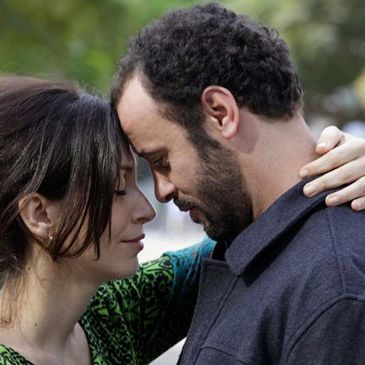
A highly regarded Arab surgeon working in Tel Aviv, Amin (Ali Suliman), the protagonist of The Attack, is the kind of sensible, good-hearted person to whom terrible things tend to happen in movies. In the filmÔÇÖs opening scene, Amin receives a prestigious award ÔÇö the ÔÇ£Oscar of the medical profession,ÔÇØ weÔÇÖre told ÔÇö and gives a heartfelt and polished speech about the importance of coexistence, and about the generosity of Israelis toward him. Later, while at work, Amin and the other doctors at his hospital hear an explosion go off in another part of town. Soon enough, mangled and dying children are being brought in ÔÇö victims of a gruesome terror bombing ÔÇö and Amin calmly, professionally, heroically gets to work. Later that night, however, long after his shift has ended, Amin is called back to the hospital and led into the morgue. There is one more victim of the bombing, it seems, an adult. And so, the good doctor is faced with what little remains of his beloved wife, Sihem (Reymond Amsalem). WhatÔÇÖs worse, authorities believe that she may be the suicide bomber.
Directed by Lebanese filmmaker Ziad Doueiri, The Attack is based on Algerian writer Yasmina KhadraÔÇÖs acclaimed best seller, and it unfolds with the patience and detail of a novel, slowly registering AminÔÇÖs incredulity and denial and then, as the evidence becomes clearer of SihemÔÇÖs guilt, his cosmic bafflement: How did an apolitical Palestinian Christian, a woman who seemingly had everything, and had, through her husband, seen the best side of Israel, turn against everything around her?
SihemÔÇÖs complicity is a fairly bold reveal on which to turn a story, and it could easily have veered into opportunistic melodrama. But the directorÔÇÖs focused restraint and SulimanÔÇÖs wonderfully understated performance keep us grounded. This is a part that calls for a lot of listening and reacting: Having left his own roots behind, Amin has to go into Nablus and reconnect with his family, in an effort to try to understand how his bourgeois wife became a terrorist and a murderer. So, itÔÇÖs something of a magic act that Suliman can keep us so captivated, even as he spends most of the film watching and responding to other people.
The Attack is not a particularly political movie, though perhaps its very even-handedness will rub partisans on either side the wrong way: Most of AminÔÇÖs Israeli colleagues remain supportive and understanding, even as he begins to drift away from them. Doueiri, who previously made the excellent films West Beirut and Lila Says, is a terrific storyteller, but heÔÇÖs also an underrated master of space and how to use it to reveal character: The stark contrast between the open, orderly spaces of Tel Aviv and the crowded chaos of Nablus becomes, in the directorÔÇÖs hands, a window into his protagonistÔÇÖs divided soul. As Amin follows various leads, including a popular firebrand cleric, the film begins to take on the rough contours of a noir. But the detective story at the heart of The Attack turns out to be a more existential one ÔÇö less a search for who ÔÇ£turnedÔÇØ Sihem and more for the emotional circumstances that led her to this end. Thus, a movie that started as a terrorism thriller and then morphed into a mystery gradually becomes an electrifying domestic drama ÔÇö one you may find very hard to shake.


